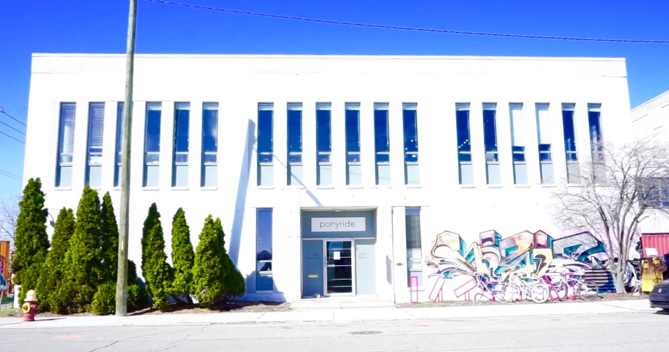As the first destination, the explorers of the Wide Open collective went to meet Ponyride, a third-place with positive impact, in the city of Detroit, Michigan.
Violently hit by the subprime crisis, this former capital of the auto industry is the first city in the United States officially declared bankrupt in July 2013. After a long period of chaos, the “Motor City” reborn from the ashes: the Downtown ruins attract investors, developers and creatives, the population stops shrinking, unemployment drops and the economy goes away. Unfortunately, this rapid development is sometimes done to the detriment of the most fragile communities and widens inequalities.
An hybrid and inclusive third-place
Some actors, however, prove that inclusive and sustainable economic development is possible in Detroit. This is the challenge of Ponyride, an NGO founded in 2011 in a 3000m² building west of the city. This hybrid third-place, built from recycled materials, hosts a coworking space, a dance studio, an event space, a carpentry and an incubator facilitating the development of sustainable initiatives in the city.
Many entrepreneurs, makers, artists and associations, carefully chosen for their passion and commitment, rent a space at a cheap price that they could not afford otherwise. Each resident must contribute to build a more inclusive, more sustainable Detroit in return. Putting into practice a philosophy of giving and receiving, some offer jobs to vulnerable populations, others train for free the young and not so young people.
A laboratory for everyone
Makers, artists, independent, small or medium-sized companies have free field to experiment, to invent, to create. Here everyone has the right to try, to fail, to start again and it is this great freedom that ultimately leads most of these projects to creating both economic and sustainable value. Everyone is united by a spirit of “makers”, resourceful and inventive, we are active, we transform, and especially we collaborate. While incubated projects cover a wide range of fields (wood, jewelery, clothing, printing, design, cosmetics), they all share a strong commitment to the most fragile communities. Here are three examples:
Rebel Nell makes jewelery out of local materials, including collecting pieces of walls from the ruins that still dot the city. The brand also changes the lives of many women in difficulty, which she uses and trains to make jewelry.
Alternatives For Girls is an association that helps young women who are homeless or in distress, keeping them away from violence, early pregnancy and sexual exploitation – sadly common situations in the suburbs of Detroit – by awareness, training and personalized support.
York Project is a StreetWear clothing brand that maintains its local fiber. Guaranteed high quality products and soon manufactured directly in Detroit, the brand committed to the homeless since its inception, has already donated more than $ 100,000 and has a mission to raise awareness through its brand on the condition of the homeless.
Invest a bigger space
Of course, Rome was not built in a day and the road was not easy for Philipp Cooley and Kate Bordine, founders of Ponyride. The project, deficit during its first 4 years, would not have survived if Philipp had not taken the risk of investing his own savings, and those of his relatives. It is only in the fifth year of activity that Ponyride achieves the balance, thanks to the commitment and perseverance of its management team, succeeding in diversifying the ecosystem’s income and strengthening the credibility of the “Ponyride” brand.
After 8 years of existence, the third place, which is now stable and economically self-sufficient, is preparing to invest a larger space. This is a new challenge for Ponyride, which intends to preserve the innovation capacity of its community, despite the challenges presented by this change of scale.
Ponyride is proof that an innovative and creative community has the power to reconcile economic performance, reduction of inequalities and sustainable innovation. You are interested in these new models of inclusive development, follow the Wide Open project!
The board of Philipp Cooley, founder of Ponyride:
“For those who would like to duplicate this model, here is my advice: keep in mind that each community is unique, listen to it and let it create its own ecosystem.”
Philipp Cooley’s interview is available on Youtube.

